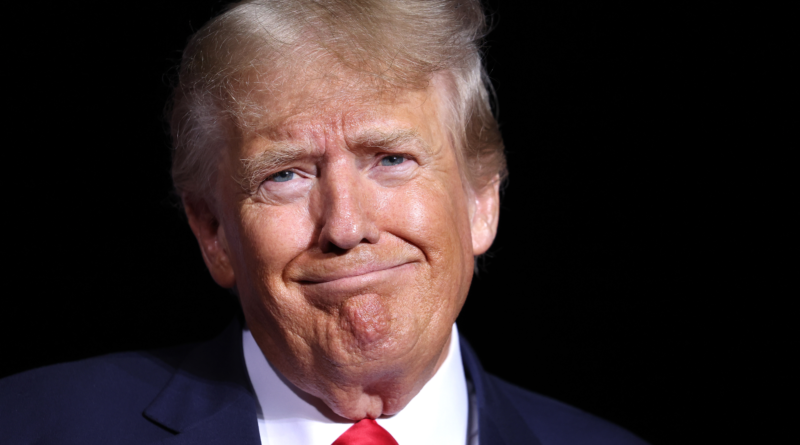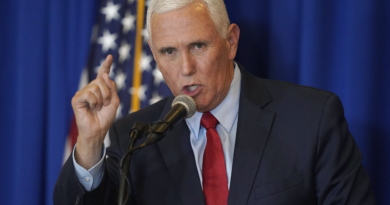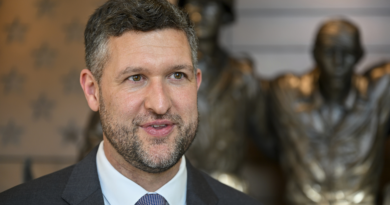GOP lawmakers mostly decline to condemn Trump over white supremacist meeting
Trump’s vice president joined several GOP members of Congress in blasting Trump’s dinner last week with Fuentes, who has often shared racist and Holocaust-denying content online, and Ye, the rapper formerly known as Kanye West who has also made antisemitic comments. The former president’s decision to dine with Fuentes and Ye soon after launching his 2024 presidential campaign has already sparked widespread condemnation from Democrats, but Republican lawmakers have been slower to speak out — and most who did so on Monday stopped short of Pence’s call for an apology from Trump.
Sen. Marco Rubio (R-Fla.), who vied against Trump in the 2016 presidential primary, said he hopes to see the former president condemn Fuentes, “because I know [Trump’s] not an antisemite. I can tell you that for a fact that Trump is not, but [Fuentes is] evil … just a nasty disgusting person. He’s an ass clown, and he’s trying to legitimize himself by being around a former, maybe future president.”
Other Republicans frowned upon the meeting itself while stopping short of outright condemnation. The Senate GOP’s No. 2 leader, John Thune of South Dakota, called the dinner a “bad idea on every level” and said whomever on Trump’s staff advised it should be fired.
“It’s ridiculous that he had that meeting,” said Sen. Joni Ernst (R-Iowa), another member of GOP leadership. “And that’s all I’m gonna say about it. Just crazy.”
Sen. Steve Daines (R-Mont.) condemned the idea of antisemitism generally when asked about the meeting, but went no further.
“We cannot tolerate antisemitism. Period,” said Daines, who’s set to chair Senate Republicans’ campaign arm for the 2024 election.
Sen. Mike Rounds (R-S.D.) said he wasn’t “gonna condemn anybody,” adding that Fuentes is “just not somebody that I would have a meeting with.” Sen. Josh Hawley (R-Mo.) struck a similar note, saying while he wouldn’t personally dine with Fuentes, “It’s a free country, [Trump] can do whatever he wants.”
Both Rounds and Sen. John Cornyn (R-Texas), a close ally of Minority Leader Mitch McConnell, said they didn’t know who Fuentes was.
“I’m really not going to spend any more time worrying about whether or not those two people are meeting with one another,” Rounds said.
Since his pre-Thanksgiving dinner with Fuentes and Ye, Trump also has said he did not know who Fuentes was when the latter — who joined scores of other white nationalists in attending the 2017 “Unite the Right” rally in Charlottesville, Va., that turned violent — came to dinner at Mar-a-Lago as a guest of Ye.
The dinner “was intended to be Kanye and me only,” Trump said in a post on his Truth Social platform, shying away from direct criticism of Fuentes.
Before Senate Republicans returned to Washington on Monday evening, one of their own had already tweeted with notably sharp criticism: Sen. Bill Cassidy (R-La.), who voted to convict Trump at his second impeachment trial, sought to put distance between Trump’s actions and the party as a whole.
“President Trump hosting racist antisemites for dinner encourages other racist antisemites,” Cassidy tweeted. “These attitudes are immoral and should not be entertained. This is not the Republican Party.”
But across the Capitol, most House Republicans have stayed more silent ahead of their return to Washington on Tuesday.
Rep. James Comer (R-Ky.), the incoming chair of the House Oversight Committee in next Congress’ GOP majority, told CNN on Monday that he “obviously” condemned the meeting, which Trump “never should have had.” Comer had been pressed to go farther than his initial comments Sunday on NBC’s “Meet the Press,” in which he said he personally wouldn’t take a meeting with Fuentes.
Retiring Arkansas GOP Gov. Asa Hutchinson told CNN on Sunday that Trump was setting a poor example by meeting with a “racist.”
“We need to avoid those kinds of empowering the extremes. When you meet with people, you empower,” Hutchinson said. He added: “Every occasion that the question of white supremacy, or neo-Nazism or denying the Holocaust comes up, you’ve got to be absolutely clear in your communication that this is not acceptable dogma.”
Burgess Everett contributed to this report.




